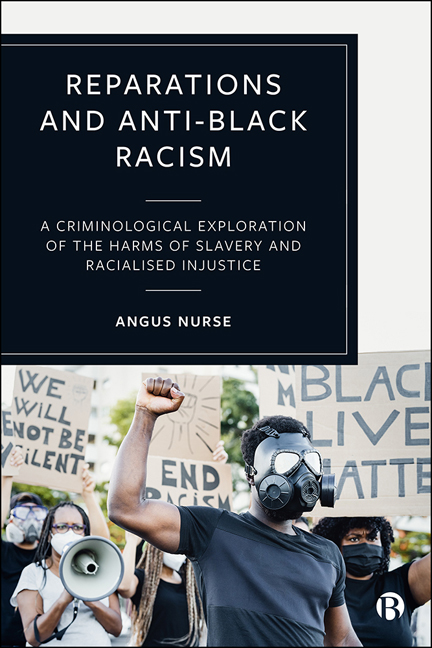 Reparations and Anti-Black Racism
Reparations and Anti-Black Racism Book contents
- Frontmatter
- Contents
- List of Abbreviations
- Acknowledgements
- Preface
- 1 Black Lives Matter: The Legacy of Slavery
- 2 Slavery and Reparations: A Criminological View
- 3 Reparations Litigation: An Overview
- 4 Victims of Slavery and Reparations: Who Suffers?
- 5 A Comparative Analysis of Reparations
- 6 Unjust Enrichment and the Socio-Legal Case for Reparations
- 7 The ‘Value’ of Reparations
- 8 The Nature of Reparations
- 9 Reparations in the 21st Century: Contemporary Debates and Issues on Reparations
- Appendix: Reparations Litigation and Settlements
- Notes
- References
- Index
3 - Reparations Litigation: An Overview
Published online by Cambridge University Press: 13 May 2022
- Frontmatter
- Contents
- List of Abbreviations
- Acknowledgements
- Preface
- 1 Black Lives Matter: The Legacy of Slavery
- 2 Slavery and Reparations: A Criminological View
- 3 Reparations Litigation: An Overview
- 4 Victims of Slavery and Reparations: Who Suffers?
- 5 A Comparative Analysis of Reparations
- 6 Unjust Enrichment and the Socio-Legal Case for Reparations
- 7 The ‘Value’ of Reparations
- 8 The Nature of Reparations
- 9 Reparations in the 21st Century: Contemporary Debates and Issues on Reparations
- Appendix: Reparations Litigation and Settlements
- Notes
- References
- Index
Summary
This chapter builds on Chapter 2's discussion of reparations as a remedy for slavery and anti-Black racism committed as a crime of the powerful and situated within state crime/state-corporate crime via a critical overview and analysis of reparations litigation to date. The Appendix provides a timeline of reparations cases while this chapter contains a brief history of the reparations movement's litigation attempts and examines the key themes and issues explored within litigation attempts and court judgements.
While it is beyond the scope of this chapter to examine all reparations litigation in depth, an overview of the scope and nature of reparations litigation is provided, supplemented with a discussion of four key cases. These cases illustrate issues arising from claims that have profit or benefit from slavery at their core as well, but some of the selected cases also deal with Jim Crow-era harms as well as ongoing injustice and anti-Black racism. For example, numerous lawsuits were filed against modern American companies in the early 2000s seeking reparations for the companies’ alleged complicity in slavery. The full extent to which the companies were complicit in or benefitted from slavery had arguably only recently come to light prompting a series of lawsuits. These cases were consolidated in federal court in Chicago, Illinois into In re African-American Slave Descendants Litigation, 375 F. Supp. 2d 721 (N.D. Ill. 2005). A broader case, Cato v United States(1995) had earlier sought damages from the US relating to the enslavement of African Americans and subsequent discrimination against them. Another case discussed in this chapter directly considers anti-Black racism by a police department and the subsequent litigation which raised human rights concerns. As this chapter identifies, slavery reparations cases are rarely successful and cases situated within claims of ongoing racism and discrimination arising from slavery and segregation face significant hurdles. But in refusing to pay reparations and in the dismissal of cases, several key issues are raised which this chapter discusses.
Reparations litigation in context
In principle ‘a program of reparations is intended to achieve three objectives: acknowledgment of a grievous injustice, redress for the injustice, and closure of the grievances held by the group subjected to the injustice’ (Darity, 2008: 656). Thus, reparations claims represent a form of restorative justice, rather than merely being punishment for past wrongs.
- Type
- Chapter
- Information
- Reparations and Anti-Black RacismA Criminological Exploration of the Harms of Slavery and Racialised Injustice, pp. 30 - 47Publisher: Bristol University PressPrint publication year: 2021


